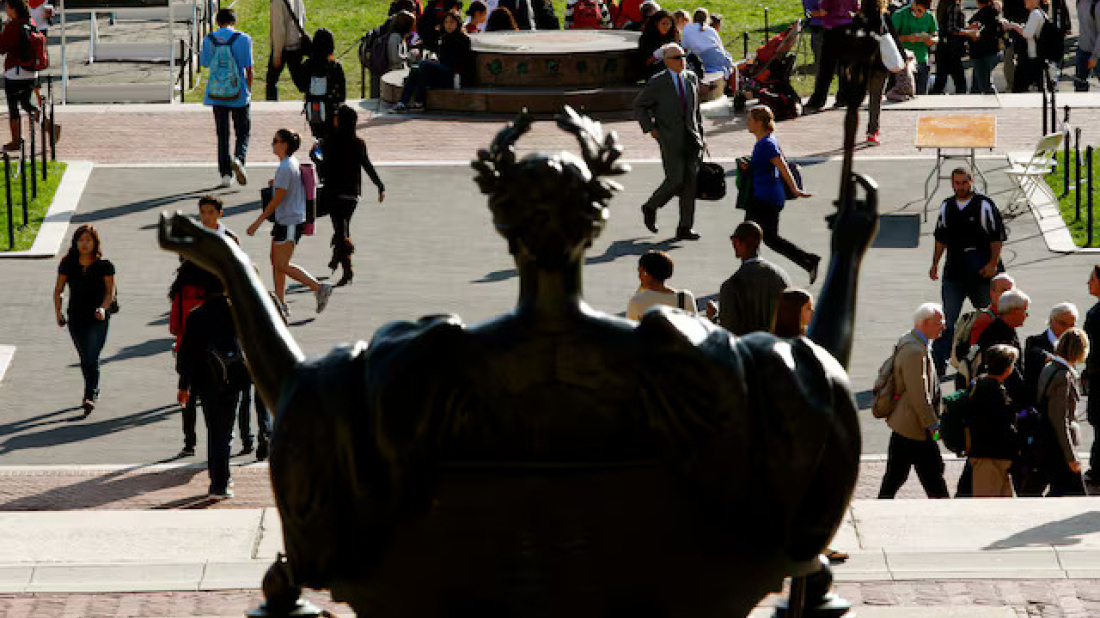The White House: U.S. ground troops ‘not part of plan’ in Iran
The White House says deploying United States ground troops in Iran is not currently part of the military strategy in ...

The Trump administration announced on Friday that it has canceled grants and contracts worth about $400 million to Columbia University, citing what it described as antisemitic harassment on and near the school’s New York City campus.
The announcement was made jointly by the departments of Justice, Education, Health and Human Services, and the General Services Administration.
According to the statement, the funding cuts are part of a broader effort to address antisemitic incidents linked to the campus environment. However, officials declined to specify which grants and contracts were affected or to provide details on the evidence supporting the allegations. The cuts are expected to come from over $5 billion in grants currently committed to Columbia, much of which supports healthcare and scientific research.
“The cancellation of these taxpayer funds is our strongest signal yet that the Federal Government is not going to be party to an educational institution like Columbia that does not protect Jewish students and staff,” said Leo Terrell, who leads the Justice Department’s antisemitism task force.
The decision is likely to face legal challenges, with civil rights groups arguing that the contract cancellations lack due process and constitute unconstitutional punishment for protected political speech. The New York Civil Liberties Union, for instance, described the move as “unconstitutional and unprecedented” and warned that it could have a chilling effect on academic freedom.
Columbia University has been a focal point of a pro-Palestinian and anti-Israel protest movement in recent years. Student groups have, at times, seized control of academic buildings and set up encampments on campus, demanding that the university cease investments in companies supporting Israel’s military occupation of Palestinian territories. The school has maintained that it is committed to combating antisemitism and other forms of prejudice on its campus while also defending its free speech rights.
In response to the announcement, Columbia issued a statement asserting its commitment to fulfilling its legal obligations and stated that staff are working with the federal government to restore its federal funding. The university did not indicate which specific grants or contracts were impacted.
Critics, including pro-Israel advocacy groups like J Street and civil rights organizations, have expressed concern that the funding cuts may serve as a broader attack on academic institutions and could force schools to overcorrect by stifling political speech. The administration’s move follows a series of high-profile disputes over campus protests and the boundaries of acceptable political expression in academic settings.
U.S. President Donald Trump said the U.S. military has enough stockpiled weapons to fight wars "forever"; in a social media post late on Monday. The remarks came hours before conflict in Iran and the Middle East entered its fourth day.
U.S. first lady, Melania Trump chaired a UN Security Council meeting on children and education in conflict on Monday (2 March), a move criticised by Iran as hypocritical following U.S. and Israeli strikes that triggered a UN warning about risks to children.
A torpedo from a U.S. submarine sunk an Iranian warship off the coast of Sri Lanka, U.S. Secretary of Defense, Pete Hegseth told reporters as the Iranian conflcit entered its fifth day on Wednesday.
The U.S. embassy in Riyadh was hit by two drones resulting in a limited fire and some material damage, the kingdom's defence ministry said in a post on X on Tuesday, citing an initial assessment.
Shahid Motahari Sub-Speciality Hospital in northern Tehran and parts of the Golestan Palace were bombed on day two of the U.S.‑Israel strikes. AnewZ Touraj Shiralilou is in Iran's capital city and said that the facility was flattened in an airstrike.
The White House says deploying United States ground troops in Iran is not currently part of the military strategy in the ongoing conflict with Tehran.
Israel has warned residents to leave a significant area in southern Lebanon, instructing them to move north of the Litani River as hostilities with the Iran-backed Lebanese group Hezbollah intensified on Wednesday.
U.S. Defense Secretary Pete Hegseth says the United States is making gains in its conflict with Iran after a key Iranian naval target was destroyed, confirming that the strike was carried out by a U.S. submarine off the coast of Sri Lanka. Rescue efforts are now under way for the ship’s crew.
Start your day informed with AnewZ Morning Brief. Here are the top news stories for the 4th of February, covering the latest developments you need to know.
Strikes across the Middle East are intensifying, fuelling travel disruption, driving up global energy prices and forcing diplomatic missions to shut their doors.
You can download the AnewZ application from Play Store and the App Store.

What is your opinion on this topic?
Leave the first comment